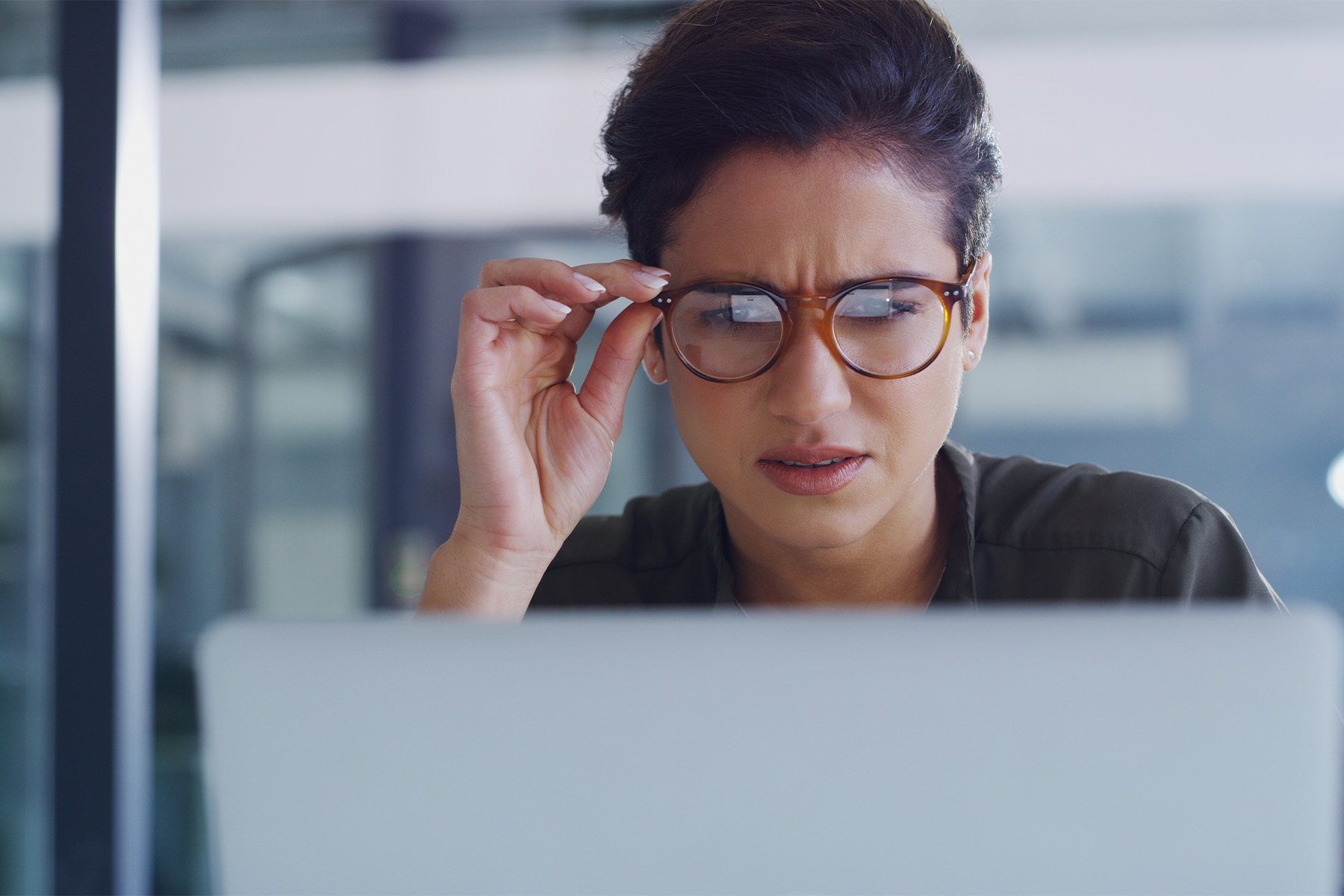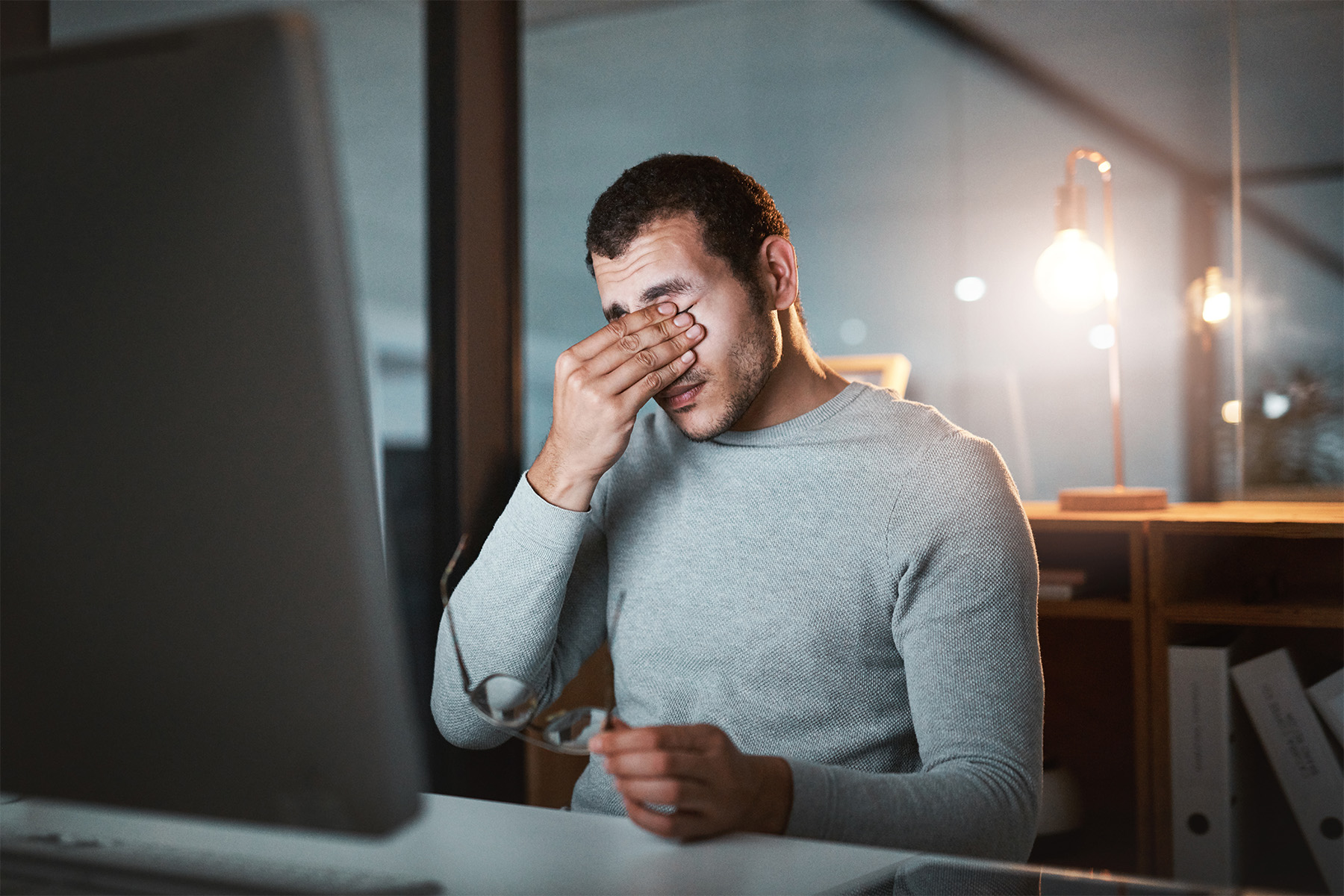
Health & Medicine
Why everybody living with dementia needs regular eye tests

Eye strain from extended screen time is a growing problem, but evidence suggests that blue light is not the cause, and blue-blockers are not the solution
Published 25 March 2024
Our lives increasingly involve looking at digital screens, both for work and leisure. This can lead to many people experiencing tired and uncomfortable eyes.
Studies estimate that around 40 per cent of people experience ‘digital eye strain’, where prolonged screen viewing is uncomfortable.

Advertisements, especially on social media, suggest a solution: blue light-filtering spectacle lenses, also known as ‘blue-blocking’ lenses.
Many of these ads claim that the blue light emitted from digital devices and artificial light sources can lead to eye strain and disrupted sleep and can even damage the retina.
So, are blue light-blocking lenses the solution?
Our research team in the Department of Optometry and Vision Sciences at the University of Melbourne have been seeking answers to key questions about the effectiveness of blue-blocking lenses and how their use might affect our health.
And, unfortunately, the answer is no, blue-blockers are probably not the solution.

Health & Medicine
Why everybody living with dementia needs regular eye tests
Light is made up of a spectrum of colours, with blue light at one end and red at the other. Light at the blue end of the spectrum (which may include blue, indigo and violet) contains more energy than other colours, like green or red.
It is this higher energy that makes blue light potentially dangerous, and in laboratory studies in animals, very high levels of blue light can cause damage to cells in the retina.
However, the amount of blue light emitted from computer and phone screens is low – very low. In fact, they produce around one-tenth the amount of the blue light you get from natural daylight on a cloudy winter’s day.
The blue light produced by digital screens is typically less than 0.4 per cent of the long-term viewing safety standard that could potentially cause damage to the retina.

Blue-blocking lenses for prescription glasses have a special coating, or other properties, designed to reduce the amount of blue light passing through the lens (and thus into the eye). Typically, the amount of blue light that is ‘filtered out’ (prevented from reaching the eye) is around 20 per cent.
This is sufficiently low that the lenses – and your vision through the lenses – don’t appear obviously altered in colour. It is also so low that they probably don’t do anything clinically significant.
Our research is focussed on these ‘clear’ blue-blockers found in prescription lenses, rather than the yellow or orange plastic lenses found in some sunglasses which block much more blue light and give the world an orange tinge.

Health & Medicine
Good sleep is key to pre-teen mental health
In 2018, we ran a national survey that involved responses from 372 Australian optometrists which revealed that three out of four recommend these products in their practice. They also reported an increase in prescribing of blue-blocking spectacles since 2010.
But this doesn’t necessarily mean it is the blue-blocking properties that underlie optometrists’ prescription of these products. Blue light-filtering coatings are increasingly becoming standard on some types of spectacle lenses, so some optometrists may recommend these lenses because of other characteristic rather than the blue filter.
To test this, we ran a double-masked, controlled clinical trial and found that blue-blocking spectacle lenses did not alleviate signs or symptoms of eye strain when compared to standard clear lenses.

Importantly, in this study neither the clinicians nor the study volunteers were aware of the type of lenses they used (hence the term ‘double-masked’). If people know they are wearing or providing the blue-blockers, they may report positive results that don’t exist because of, for example, their bias towards believing the advertising.
We also did a systematic review of other studies that have looked at this and similarly found that blue-blockers don’t reduce digital eye strain.
Our recent Cochrane Review, which included 17 randomised controlled trials, aimed to answer the question of whether blue-blocking lenses protect eye health or improve sleep.
Cochrane Systematic Reviews play a crucial role in evidence-based decision-making. They are comprehensive analyses synthesising the best available research evidence, from multiple studies, as a foundation for guiding healthcare professionals to make informed choices about patient care.

Health & Medicine
Three things schoolkids need to succeed
The review confirmed our earlier work that blue-blocking lenses do not provide benefits for reducing eye strain from computer use, particularly in the short term.
However, the impact on sleep quality remains uncertain, due to inconsistent results across studies. It is also unclear whether people with different medical conditions might, or might not, respond differently to using these lenses.
We also found that there have not yet been any long-term clinical studies to evaluate the effects of blue-blocking lenses on eye health. This is not surprising, given that environmental sources of blue light have such a low propensity to damage the eye.

Our assessment of the current, best evidence indicates that there is likely no advantage to using blue-blocking spectacle lenses over standard clear lenses for reducing screen-induced eye strain.
If you spend extended periods on screens and seek ways to promote eye health and reduce eye strain, we recommend a comprehensive eye examination with your eye care provider and a review of your workstation ergonomics.
It is also important to wear ultraviolet (UV)-protective sunglasses when you spend time in the sun. While the impact, if any, of blue light from screens on our eye health is uncertain, the potential for long-term exposure to the sun’s ultraviolet rays to induce eye damage is unequivocal.
Banner: Getty Images